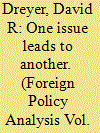| Srl | Item |
| 1 |
ID:
100264


|
|
|
|
|
| Publication |
2010.
|
| Summary/Abstract |
Rather than competition over one issue or another (such as territory or status) leading to war, in this study it is argued that war is often likely the result of an issue spiral-a dynamic process in which tension increases as multiple issues accumulate. Once an initial issue disagreement is established, the development of enemy images may cause states to view the "other's" behavior and intentions in relation to additional issues as threatening. States may subsequently seek to gain an advantage on a new issue in order to prevent one's competitor from doing so, or in order to gain leverage on other issues. A state's aggressive actions in relation to new issues tend to reinforce their rival's perceptions that the state has aggressive intentions in relation to earlier established disagreements, further increasing tension. Issue accumulation, furthermore, increases the stakes of competition, which increases the likelihood that states will be willing to bear the costs of war seeking favorable issue settlement. As tension heightens and the rationality of engaging in large-scale militarized conflict increases, a state may initiate war if a rival presses its demands on an issue fearing that failure to demonstrate resolve will lead one's competitor to press its demands on other issues as well. An examination of relations between China and Vietnam in the 1970s reveals that an issue spiral, in which one issue led to another and the accumulation of issues contributed to the deterioration of relations, precipitated the 1979 Sino-Vietnamese War.
|
|
|
|
|
|
|
|
|
|
|
|
|
|
|
|
| 2 |
ID:
153549


|
|
|
|
|
| Summary/Abstract |
This research provides the first empirical study examining the actual role that the Chinese Righteous War Tradition (CRWT) played in Chinese decisions for external war between 1950 and 1979. It aims to answer particularly whether the consideration of righteous war was treated as the decisive influence or simply as an instrument for legitimating such a decision. This research traces the role that the CRWT played in successive Chinese leaders' decision in three cases—the Korean War, the Sino-Indian War, and the Sino-Vietnamese War. The findings indicate that the ideas of the CRWT were largely used to assess and legitimate the decision for external war. However, the assessment of righteous causes generally occupied a lower priority and did not play the decisive role in determining the decision for external war. The actual role of the CRWT may largely be an instrument to help the Chinese to find legitimacy, and the legitimacy may have the potential to assist the Chinese to choose what should be done from among the options based on different pragmatic calculations.
|
|
|
|
|
|
|
|
|
|
|
|
|
|
|
|